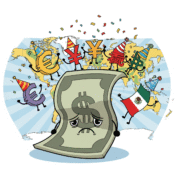The European Dilemma in a Multipolar World
The global landscape is shifting. The established world order, largely shaped by the post-Cold War era, is giving way to a more multipolar system characterized by the resurgence of great power competition. Three figures loom large in this evolving dynamic, each representing a distinct sphere of influence: the US, Russia, and China. Their interactions, ambitions, and approaches to international relations are reshaping alliances and creating new geopolitical realities.
This realignment isn't simply a return to the Cold War. The interconnectedness of the 21st century, coupled with the rise of new technologies and transnational challenges like climate change, adds layers of complexity. While ideological differences persist, the driving forces are increasingly about power, influence, and access to resources. We are witnessing the rebuilding of blocs, not necessarily along strict ideological lines, but rather driven by shared interests, perceived threats, and economic incentives.
The US, under its current leadership, has pursued a more transactional approach to foreign policy, often questioning long-standing alliances and emphasizing burden-sharing. This has created both opportunities and anxieties for its traditional partners. While some welcome a more equitable distribution of responsibility, others fear a weakening of US commitment to collective security.
Russia, under its strongman leader, has sought to reassert its influence on the world stage, particularly in its near abroad. Its actions in Ukraine and elsewhere demonstrate a willingness to use military force to achieve its strategic objectives. This assertiveness has solidified some alliances while simultaneously pushing others closer to NATO and the West.
China, led by its president, Xi Jinping, is arguably the most dynamic force in this new geopolitical landscape. Its remarkable economic growth has translated into increased military capabilities and a desire to play a greater role in global governance. China's Belt and Road Initiative, a massive infrastructure project spanning continents, is a clear example of its ambition to expand its influence and create new economic and political dependencies.
The European Dilemma
Europe finds itself in a precarious position. Caught between these competing powers, the continent faces difficult choices. Its traditional reliance on the US for security is being tested, while the economic allure of China is undeniable. Russia's actions in Ukraine have shaken the foundations of European security and exposed vulnerabilities.
The challenge for Europe lies in forging a common foreign and security policy that allows it to act as a unified and independent actor on the world stage. This requires overcoming internal divisions and developing a stronger sense of collective identity. The EU must decide whether it wants to be a junior partner in a US-led order, a bridge between East and West, or a distinct power center in its own right.Several potential paths lie ahead:
* Transatlanticism Revived: A renewed commitment to the transatlantic alliance could see the US and Europe working together to counter Russian aggression and manage the rise of China. This would require a greater willingness on both sides to address each other's concerns and share burdens.
* A Eurasian Bloc: Closer economic ties between Russia and China could create a powerful Eurasian bloc that challenges the West's dominance. This scenario would present Europe with significant strategic challenges, forcing it to reassess its relationships with both East and West.
* European Strategic Autonomy: The EU could choose to pursue a path of strategic autonomy, developing its own military capabilities and forging its own relationships with other powers. This would require a significant investment in defense and a greater willingness to act independently of the US.
The future of geopolitics is uncertain. The choices made by these key actors in the coming years will have profound implications for the global order. For Europe, the ability to navigate these complex dynamics will determine its role and influence in the 21st century.



